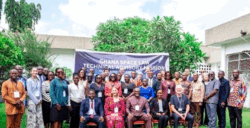A former Director-General of the Ghana Health Service, Professor Agyeman Badu Akosa has reechoed calls for the passage of the Occupational Health and Safety Bill into law to protect the safety of workers in the country.
The bill when passed will provide a comprehensive framework for ensuring the safety and health of workers, however, it has been pending in parliament for more than a decade.
The absence of this law means that suffering severe injuries at work leaves employees vulnerable, with no legal recourse to claim support.
“If employees suffer injuries at the workplace, there is currently no legal framework to support them or hold employers accountable. This leaves injured workers without the justice or compensation they deserve,” he lamented.
He was speaking at the International Facility Management Association (IFMA) Global Conference held in Accra on the critical role of facility management in enhancing employee productivity and well-being in the African workplace.
Prof. Akosa emphasised, “Facility management, often overlooked, is pivotal in shaping the future of our organisations across the continent. It is the cornerstone of creating workspaces that foster productivity and enhance well-being.”
He explained that facility management encompasses various disciplines such as project management, health and safety, risk management, and more. These areas ensure that workplaces are functional, comfortable, and safe.
“In the African context, where infrastructure challenges can be significant, effective facility management is essential. The environment in which employees operate is deeply influenced by these factors, which directly impact their ability to perform at their best,” he stated.
Health and safety, according to Prof. Akosa, are non-negotiable priorities in any workplace.
“Providing a safe work environment in Africa is not just a legal obligation; it is a moral imperative,” he asserted.
He also highlighted the importance of training all employees in first aid and safety standards, ensuring that every office is equipped with trained first aiders and fire wardens.
“Stress is a major factor that can negatively impact productivity. By creating environments that offer tranquility, we can significantly enhance employee mental well-being.
“Let us commit to investing in facility management, embracing innovative practices, and prioritizing the well-being of our employees. By doing so, we can create workplaces that are not only productive but also places where employees thrive,” he urged.

For his part, IFMA Ghana President, Sampson Opare-Agyemang noted the importance of collaboration, innovation, and the future of facility management in Africa.
Reflecting on the achievements of the IFMA Ghana Chapter, Opare-Agyemang highlighted the substantial progress made in recent years, saying the chapter has successfully trained 124 facility management professionals and certified five managers, setting new benchmarks for excellence and leadership.
This commitment to education extends beyond training programmes, with several universities across Ghana, including Ho Technical University, Kumasi Technical University, and Sunyani Technical University, introducing undergraduate courses in facility management, a crucial development for the future of the profession.
The president also announced that Accra Technical University has received accreditation to start a facility management course, marking a significant expansion of academic offerings in the field.
This development, he noted, is vital to changing the narrative of poor maintenance culture in Ghana.

Looking ahead, Mr. Opare-Agyemang urged the facility management community to embrace innovation and technology, which he described as both opportunities and challenges.
“We must continue to evolve, adapt, and innovate,” he stated, underscoring the importance of mentorship programmes, internships, and continuous professional development opportunities to empower the next generation of facility managers.










